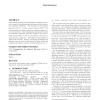152 search results - page 3 / 31 » Why is quantum physics based on complex numbers |
STOC
2004
ACM
14 years 6 months ago
2004
ACM
The problem of finding a local minimum of a black-box function is central for understanding local search as well as quantum adiabatic algorithms. For functions on the Boolean hype...
ICALP
2001
Springer
13 years 10 months ago
2001
Springer
We consider the quantum complexities of the following three problems: searching an ordered list, sorting an un-ordered list, and deciding whether the numbers in a list are all dis...
ISCA
2007
IEEE
13 years 5 months ago
2007
IEEE
In recent years, quantum computing (QC) research has moved from the realm of theoretical physics and mathematics into real implementations [9]. With many different potential hardw...
SOFSEM
2009
Springer
13 years 10 months ago
2009
Springer
In this text we will discuss different forms of randomness in Natural Sciences and present some recent results relating them. In finite processes, randomness differs in various ...
CIE
2007
Springer
13 years 12 months ago
2007
Springer
In the framework of parameterized complexity, exploring how one parameter affects the complexity of a different parameterized (or unparameterized problem) is of general interest....

